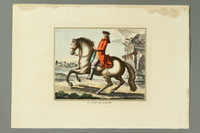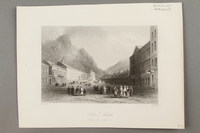Overview
- Description
- The Horia Stamatu papers consists of largely post-war materials including manuscripts, drafts, and published versions of Stamatu’s writings, essays, and poetry. The correspondence includes letters, postcards, telegrams, and holiday cards with various family members and friends including men who served with Stamatu in the Iron Guard. The papers also include artwork by Alexander Lungu; photographs; financial materials; and printed materials including clippings from newspapers, journals, and magazines.
- Date
-
inclusive:
circa 1895-1990
- Credit Line
- United States Holocaust Memorial Museum Collection, Gift of Marion Stamatu-Wilting
- Collection Creator
- Horia Stamatu
- Biography
-
Horia Stamatu (1912-1989), a Romanian author and poet, was born on September 9, 1912 in Vǎlanii de Munte, Romania. He worked as a substitute teacher at Cantemir Vodǎ High School in Bucharest. From 1938 to 1940, he served as an editor of the Enciclopedia Romaniei. He became a member of the Iron Guard and participated in the Legionnaires’ rebellion in Bucharest which took place on January 21-23, 1941. The rebellion coincided with the violent Bucharest pogrom. Following the rebellion and pogrom, Stamatu fled Bucharest for Germany, traveling through Bulgaria. From 1942-1944 he was imprisoned at the Buchenwald concentration camp and was sentenced to death in absentia by a Romanian military tribunal. The sentence was never fulfilled. Stamatu was eventually released from Buchenwald. In 1945, he studied philosophy with Max Müller at the University of Freiburg and held lectures in linguistics focusing on Romanian. Horia Stamatu lived in Paris, France from 1948-1950, where he helped found a Romanian research institute. He lived in Spain from 1951-1961 and worked as an editor for several magazines at which time he co-founded the Libertatea românească and Fapta magazines. In 1961, Stamatu moved to Freiburg, where he lived until his death in 1989.
Physical Details
- Extent
-
45 boxes
3
- System of Arrangement
- The Horia Stamatu papers are arranged in twelve series.
Series 1: Manuscripts, circa 1930s-1980s, undated
Series 2: Correspondence, 1895-1990s, undated
Series 3: Subject files, circa 1950s, undated
Series 4: Notes, undated
Series 5: Biographical materials, circa 1950s-1960s
Series 6: Financial materials, circa 1950s-1980s
Series 7: Ephemera, 1970s, undated
Series 8: Artwork, undated
Series 9: Photographs, undated
Series 10: Printed Materials, circa 1950s-1990s
Series 11: Notebooks, 1967, undated
Series 12: Audio Materials, 1969
Rights & Restrictions
- Conditions on Access
- There are no known restrictions on access to this material.
- Conditions on Use
- Material(s) in this collection may be protected by copyright and/or related rights. You do not require further permission from the Museum to use this material. The user is solely responsible for making a determination as to if and how the material may be used.
Keywords & Subjects
- Geographic Name
- Romania.
- Personal Name
- Barbu, Ion, 1895-1961. Barsan, Eugen. Brana, George. Costin, Eugenie. Dumitrescu, Luca. Eliade, Mircea, 1907-1986. Halmaghi, John. Horia, Vintilǎ, 1915-1992. Ierunea, Virgil. Ionesco, Eugéne, 1909-1994. Lorca, Federico Garcia. Lungu, Alexandru. Petra, Nicolae. Poenaru, Alexie. Pop, Ioan-Aurel, 1955- Popescu, Mircea. Racoueanu, George. Stamatu, Horia, 1912-1989. Stamatu, Marianne. Uscatescu, Jorge, 1919-1995. Vuia, Octavian. Vulcǎnescu, Mircea, 1904-1952.
Administrative Notes
- Holder of Originals
-
United States Holocaust Memorial Museum
- Legal Status
- Permanent Collection
- Provenance
- Marion Stamatu-Wilting donated the Horia Stamatu papers to the United States Holocaust Memorial Museum in 2016.
- Funding Note
- The cataloging of this collection has been supported by a grant from the Conference on Jewish Material Claims Against Germany.
- Record last modified:
- 2023-02-24 14:29:17
- This page:
- https://collections.ushmm.org/search/catalog/irn550855
Additional Resources
Download & Licensing
- In Copyright - Use Permitted
- Terms of Use
- This record is not digitized and cannot be downloaded online.
In-Person Research
- Request 7 Days in Advance of Visit
- Plan a Research Visit
-
Request in Shapell Center Reading Room
Bowie, MD
Contact Us
Also in Horia Stamatu collection
The collection consists of correspondence, documents, manuscripts, and other materials related to the life and career of the donor's father, Horia Stamatu (1912-1989), the Romanian poet and essayist, and onetime member of the Iron Guard. Most of the materials document Stamatu’s career as a writer, poet, and philosopher living in Freiburg, Germany, from the late 1950s through the 1980s.

Ink drawing
Object
Black ink drawing on white paper depicting a skeleton wielding a scythe, battling ancient Greek or Roman soldiers with swords and shields.

Print of man on horseback
Object
Color print - possibly hand-colored - depicting a man dressed in a yellow coat on horseback.
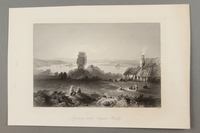
Print depicting Trajan's Bridge
Object
Black and white print of a landscape including Trajan's bridge.
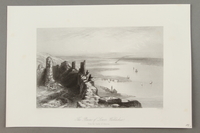
Print of the Plains of Lower Wallachia
Object
Black and white print depicting the plains of Lower Wallachia as seen from the Castle of Sistova.
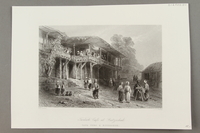
Print, Turkish Cafe at Rutzschuk
Object
Black and white print depicting the outside of a Turkish cafe in Rutzschuk, Bulgaria.
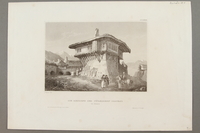
Print, Die Residenz des Turkischen Pascha's zu Orsova
Object
Black and white print depicting the outside of a building in Orsova, Romania.

